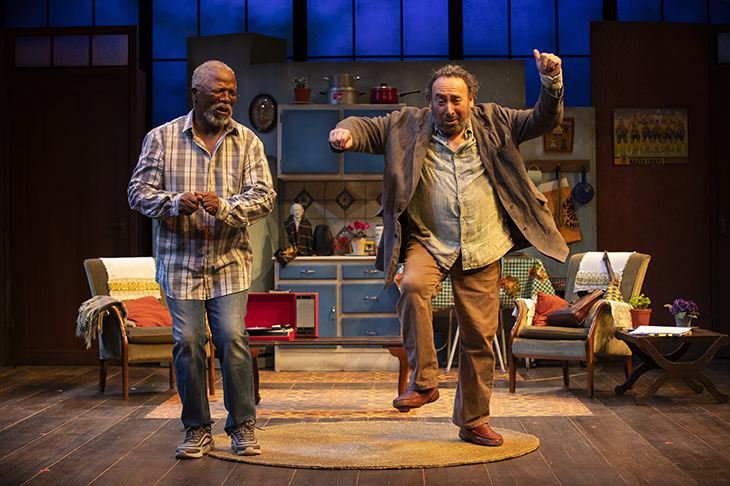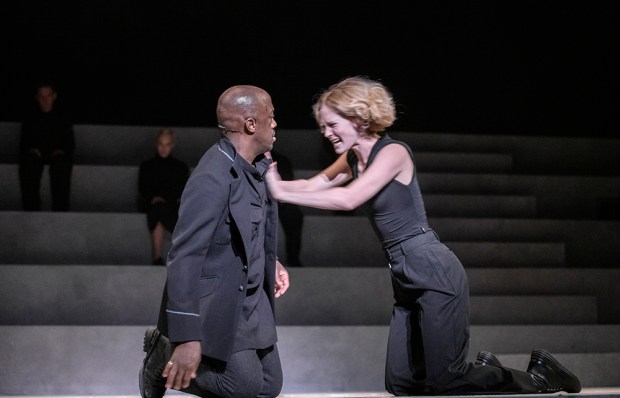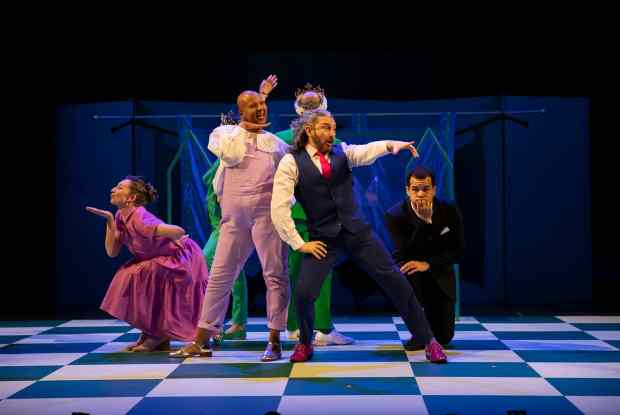The Gift is three plays in one. It opens in a blindingly white Victorian parlour where a posh lady, Sarah, is teaching her clumsy maid to serve tea correctly. Both characters are black. Sarah’s prosperous husband, also black, arrives home and the scene continues as the gauche skivvy (Donna Berlin, brilliant) makes more and more hilarious blunders. What is this play? Perhaps a neglected Victorian comedy revived with colour-blind casting. In fact, the script is inspired by a historical character, Sarah Forbes Bonetta, a Yoruba princess born in Nigeria in the 19th century, who was adopted by Queen Victoria and raised as an English gentlewoman.
A drama about a solitary black female living in high Victorian society would be fascinating, but the writer, Janice Okoh, has thrown in two extra black characters, Sarah’s husband and the maid. These additions seem improbable but the play doesn’t give a hoot about distinctions of fact and fiction as long as it can make everyone laugh. Which it does. It’s also extremely confusing.
The action shifts to present-day Cheshire where a prosperous black couple are enjoying a quiet night in. Ding dong. Their white neighbours arrive with a gift of gluten-free cakes. The wife is desperate to flaunt her success in a TV baking competition but she pretends to find her notoriety embarrassing. The subject of race crops up, of course, and the white pair strive to demonstrate their lack of prejudice. The dialogue, often brilliantly funny, touches on taboo subjects such as the fact that black athletes predominate in track and field events but rarely win swimming trophies. ‘Black people can swim,’ explains the white woman, ‘but choose not to because of their hair.’ To prove her affiliation with black culture she performs a pastiche of a Beyoncé disco-orgasm in the sitting room.
This one-act comedy is audacious, revelatory and ingeniously plotted, but it carries more than a hint of unconscious bias. The white couple are childishly awkward while the black pair are wise, unflappable and infinitely patient. The script makes the common error of assuming that racism is an exclusively white affliction.
Finally, a half-hour sketch in which Queen Victoria and Sarah Forbes Bonetta discuss African migration to Britain. Rather a dreary topic. The script is weakened by the presence of a third female (the black woman from Cheshire), who interrupts the dialogue with political observations. Even worse, her character is visible to Sarah but not to Queen Victoria. This clumsy, unilluminating skit ends with a ‘comedy’ murder involving a spear. The Gift is due to tour parts of the country where the topic of racial disharmony bears less weight than it does in London. Cutting the last act would help.
Kunene and the King, set in modern South Africa, tackles the same issues with far more dramatic finesse. The title requires explanation. Kunene is a black carer hired to look after Jack, an ailing white actor, who wants to play Lear (hence ‘the King’) before he dies. A tricky love-hate relationship evolves between the pair as they explore their shared interest in drama. Kunene has studied some Shakespeare plays in his native tongue but he’s unfamiliar with Lear. He finds it incredible that the elderly king has only daughters to inherit his realm. An African chief, he says, would sequentially impregnate all his female courtiers until one of them bore him a son. OK, says Jack, but the play is about whites, not blacks.
During their verbal tussles, both men see the other as a typical representative of his race and not as a unique individual. And both of them mock this tendency in the other. The play moves beyond the protocols of ethnic tension. Jack is the son of an English professor (‘very ambitious, very disappointed’), who encouraged him as a young thesp. Jack’s actorly reminiscences include a dazzling speech about suffering stage fright during an ill-attended matinee. In the middle of an important scene, Jack finds himself battling a parliament of voices in his head which are urging, daring and tempting him to forget his next line. The hilarity and the horror of the panic attack are brilliantly conveyed. Acting schools should adopt this as a standard audition piece. The show is enlivened by physical comedy as Jack, a paunchy alcoholic, flits about the stage taking furtive swigs from hidden gin bottles whenever Kunene exits the room.
This is the best sort of role for Antony Sher, who has the physique but not the instincts of a comic, and who finds magical elements of warmth and lightness in the spiteful, curmudgeonly Jack. John Kani (Kunene) seems a little too eager to understand and forgive his grouchy sparring partner. But it scarcely matters. Kani also wrote the script. This terrific two-hander is currently berthed at the smallish Ambassadors. It belongs at the National.
Got something to add? Join the discussion and comment below.
Get 10 issues for just $10
Subscribe to The Spectator Australia today for the next 10 magazine issues, plus full online access, for just $10.
You might disagree with half of it, but you’ll enjoy reading all of it. Try your first month for free, then just $2 a week for the remainder of your first year.














Comments
Don't miss out
Join the conversation with other Spectator Australia readers. Subscribe to leave a comment.
SUBSCRIBEAlready a subscriber? Log in